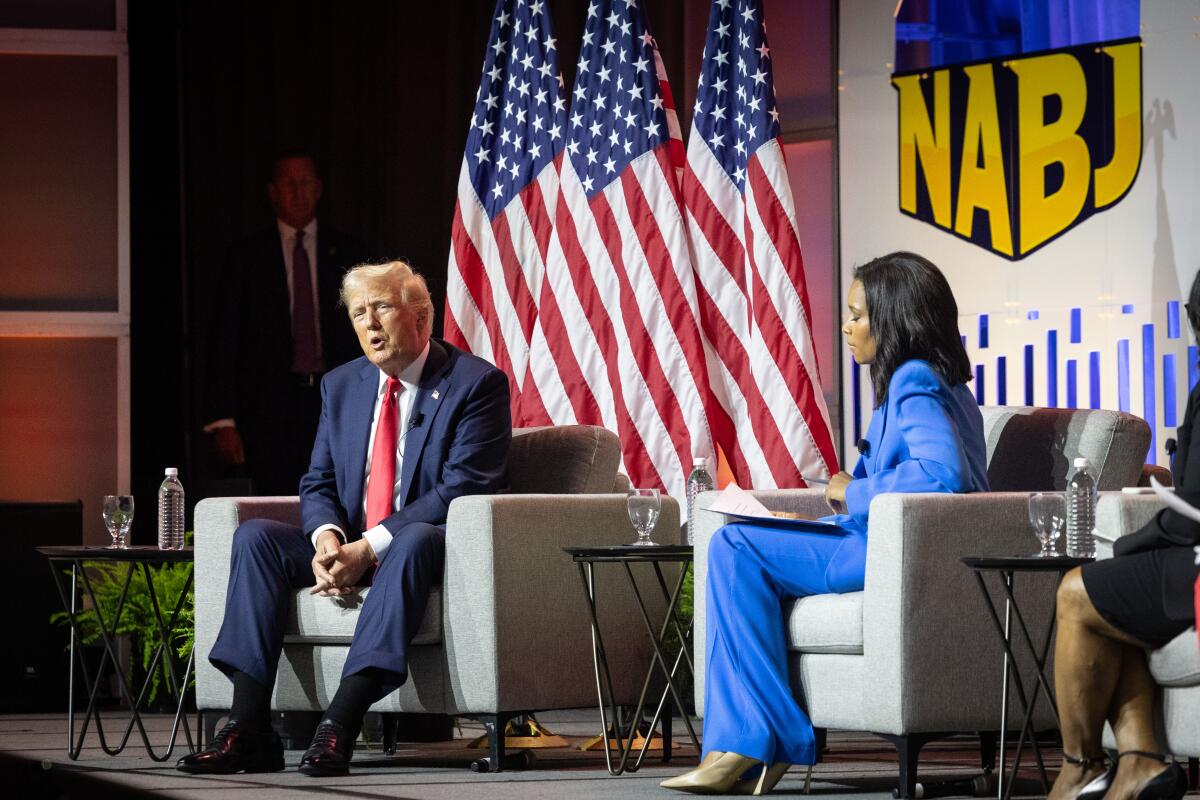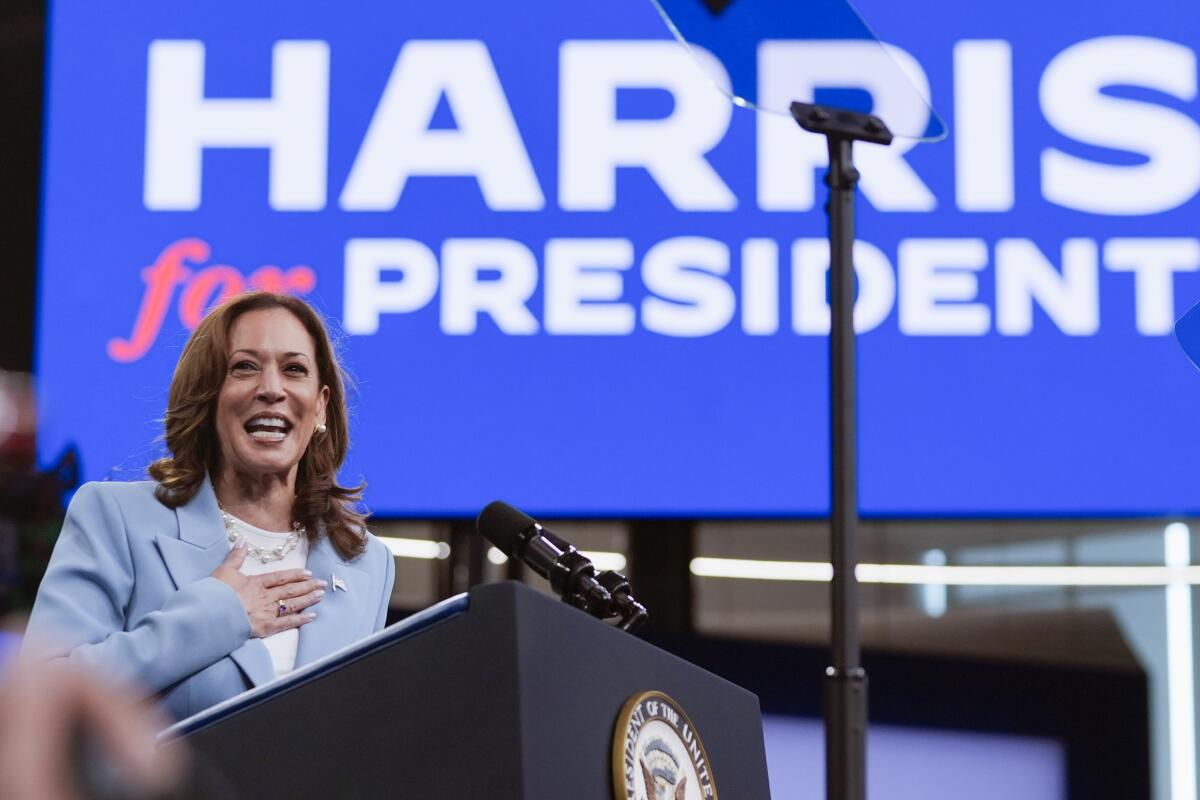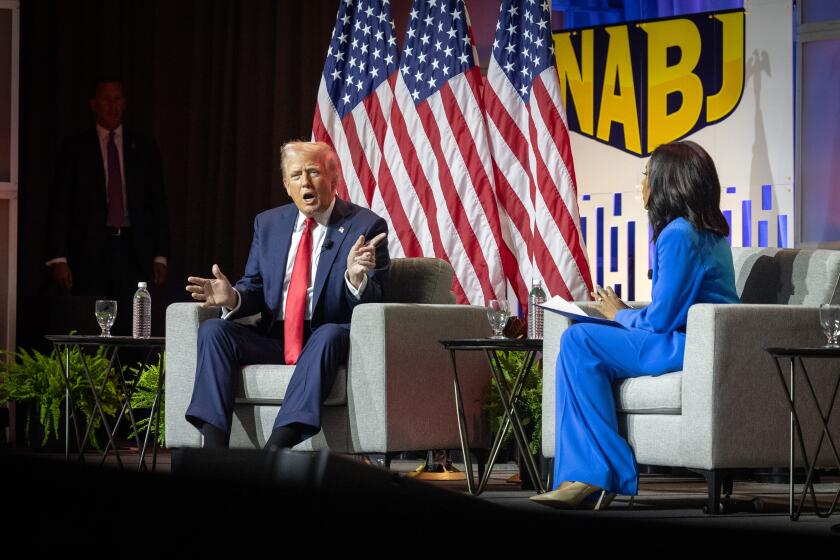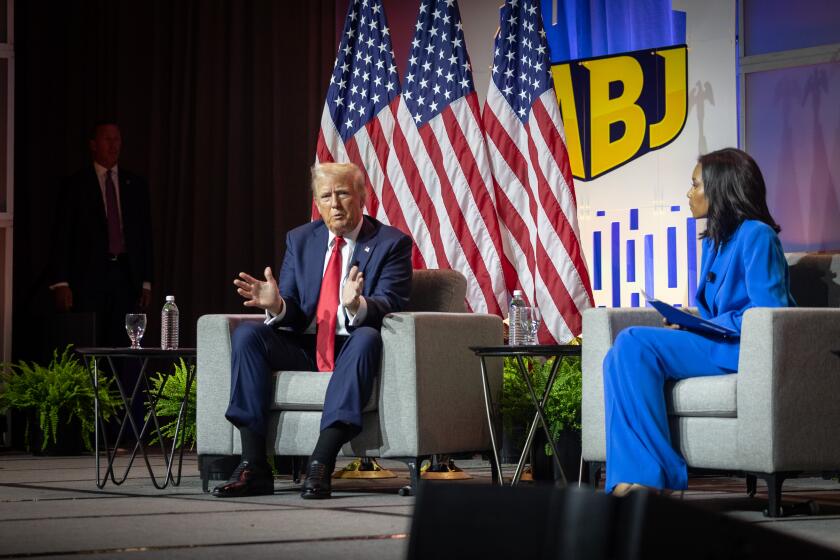Column: Trump is trolling the Democratic Party about Harris’ mixed-race identity. Will it work?

- Share via
In 2020, I wrote a column about Kamala Harris’ mixed-race identity in which I made the case that a lack of critical thinking on race would make it easier for unscrupulous politicians to manipulate voters.
Four years later, that theory is being put to the test. Onstage last week at the National Assn. of Black Journalists convention, former President Trump tried to raise questions about the authenticity of the vice president’s identity, implying she had changed races to get votes.
Trump is perhaps the last person on Earth whose racial commentary I’d take seriously. What he said was not just juvenile but obviously insincere. In modern internet parlance, he is outrage farming, trolling, speaking disingenuously purely to get a response. And I have to ask: Is it working?
During a National Assn. of Black Journalists interview, Trump said of Kamala Harris, ‘I didn’t know she was Black until a number of years ago, when she happened to turn Black.’
Even such a transparent attempt to discourage Black and South Asian voters from supporting Harris has sparked understandably furious reactions. His comments were crudely delivered to an audience of Black journalists, a context that added insult to injury.
Now, even though no liberal I know would be seriously swayed by Trump’s racial analysis (if you can call it that) we are trapped in the news cycle he has created. And I begrudge every second spent taking Trump’s trolling seriously. Harris was born to a Black father and Indian mother, so she is Black and Indian. I won’t go through an analysis of why people born to parents with two races are both of those races rather than one, because it doesn’t need to be explained.

This isn’t critical race theory. This is just the birds and the bees. This is one plus one equals two.
When Harris appeared on “Asian Enough,” a podcast I co-hosted for the Los Angeles Times, she expressed impatience with the demand that she articulate a journey of racial discovery, namely because she believes she didn’t have any such story to tell.
“I didn’t go through some evolution about, ‘Who am I, and what is my identity,’” Harris said. “I guess the frustration I have is that people think that I should have gone through such a crisis and need to explain it.”
I understand if you’re skeptical of this story because it is too convenient, too aspirational, too uncontroversial. Sure, Harris’ childhood probably wasn’t a post-racial dream, no more than former President Obama’s. But if there’s any place in America where a child may have grown up with secure attachments to both halves of a mixed-race identity, it would probably be Northern California in the 1970s, one of the most diverse and progressive places in the nation.
And I never truly expected her to racially triangulate herself on our podcast. I expected her to do what every politician has ever done, which is present the identity that is most likely to win votes. When Trump is the alternative, why take the risk?
The former president wants us to talk about the silly things he says, so we don’t focus on the harmful things he’s planning — as laid out in Project 2025.
It’s more important to me to analyze the assumptions behind Trump’s trolling. Namely, that in America you’re supposed to vote for whoever will put the most money in your pocket. And you’re supposed to believe that the person most likely to put the most money in your pocket is someone who is the same race as you.
That implies that a vote is not a democratic act but a transaction, like trying to pick the bank or credit card with the best terms and perks. It recasts America as not a country but a company, where voters choose not just a leader but a CEO, the best one being one from our own tribe.

It’s a piece of conventional wisdom, “voting your pocketbook.” But am I supposed to believe the bizarre conclusion that my lot in life improves because Harris is part Indian and, in America, we are both considered Asian American, and thus some benefit will flow to me?
We have to ask ourselves why Trump is trying to convince us that one plus one does not equal two. Who benefits from rigid tribalism about racial identity?
Definitely Trump and his supporters. But also, anyone who doesn’t want to spend time or resources thinking about or dealing with race.
Whether that’s campaigns that are content with one photo-op per race, no more, or politicians whose racial outreach ends at placing one person of each race in the backdrop of their speech. We are easier to marginalize and to pacify if we fold ourselves into such tiny boxes.
We have to resist that flattening wherever we see it. Treat Trump’s comments as you would those of any other online troll: Forget them, as soon as possible.
More to Read
Sign up for Essential California
The most important California stories and recommendations in your inbox every morning.
You may occasionally receive promotional content from the Los Angeles Times.













